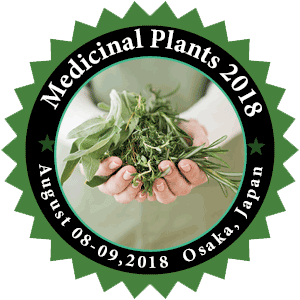
Nermeen Shanan
National Research Centre, Egypt
Title: Improvement sweet basil productivity under salinity condition
Biography
Biography: Nermeen Shanan
Abstract
Recently using moderately saline water in agriculture production is a must, especially for medicinal plants as a tolerant salinity. Field trials were carried out during two successive seasons of 2015 and 2016 in Rejwa area to evaluate the effect of water salinity, WS (0.68 and 2.45 dS/m) under water deficit (100, 80; 60 % from evapotranspiration, ETo) on sweet basil plant growth characters and pigments contents. Results indicated that the determined plant growth characters (plant height, number of branches, plant weight; leaves weight) were under WS (0.68 dS/m) and the opposite was true in case of the WS 2.45 dS/m. Increasing water WS associated with decreasing in studied plant growth characters under different water deficit treatments. The highest chlorophyll a, b were recorded under WS under 80% ETo, while the opposite was found at WS2.45 dS/m at 60 %ETo. Increasing WS caused increasing oil and carotenoids by 44 and 48 %, respectively, while increasing water deficit increase these values. Macronutrients strongly affected by increasing WS and the values were higher under 2.45 than of 0.68 dS/m. Increasing WS improved N, P and K %. Improvement of the Ca and Mg content associated with increasing WS by 4 and 8%, respectively. The potential accumulation of the Na and Cl in sweet basil leaves were observed at 60 %ET and WS 2.45 dS/m followed by fresh water (0.68 dS/m) at 100 %ETo. It could be concludes that irrigation by WS (2.45 dS/m) is preferable with 22% reduction in yield at water deficit 80%ETo.

